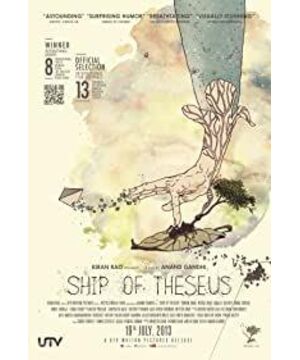This Indian film is very unusual, and I am amazed at this level as a directorial debut. The most prominent part is that the film is also two or three hours long, but there are no singing and dancing parts of the usual Indian films. The whole film is very calm, like a serious documentary, with an ice blade straight into the heart.
The title of the film reveals everything, and the whole film is divided into three parts:
the first story tells about a blind photographer. After changing his eyes, it is like changing the operating system. The five colors are blinding, and the conversion is finally completed. The feeling of flying. This part discusses art. The so-called art is to reach the essence by retaining the appearance of things, black and white or color, smell or vision is not important.
By the way, there are many high-tech devices in this part, such as color pens, blind cameras, tactile photos, etc. These devices replace the function of the eyes, which makes her pursue a different kind of art. Her black and white photos Presenting a quiet, solemn style. After the eye transplant, she became confused and accepted, and began to see the world with her own eyes rather than technology, an extension of the human body, and she began to accept the beauty of color photos.
Has she changed? Has the world changed?
The second story tells about a great Zen master like Gandhi (interestingly, the director is called Gandhi), who was seriously ill, but refused to take medicine and refused to accept an organ transplant because he believed that those medicines were obtained through inhumane animal experiments. He will feed tigers with his body until inhumane animal experiments are banned. This part is about religion. If you don't know Indian Buddhism, it is difficult to understand why he did it, but even so, even if you think he is pedantic, you have to admit his greatness.
It is worth mentioning that his disciples persuaded him to receive therapy. In addition to the Buddhist content, there is also ancient Greek science/philosophy, namely, Leukiper's atomic theory, we and the world are all made of atoms, and before the atoms that make up me, maybe It is what I eat, and the atoms in my body may also be eaten by others in the future. Everything is me, and I am everything, combined with Democritus's little universe, the universe inside us.
If everything is me, who am I?
The third story tells the story of a young man receiving organ transplants who accidentally discovered the inside story of organ transplants. This part is about politics and society, a theme that has appeared in many sci-fi works, such as "Repo Men".
This raises a question that has puzzled the scientific community for a long time. Does organ transplantation change a person's character? For example, if A transplants B's heart, will A become B, or why does the protagonist completely change into a person? Is this just a scientific question?
Finally, through a body donor who has never shown his face, the director is very smart to put all these people on, and the protagonists in the story have all received organs from a certain part of them. When the donor's video came out, I thought it would be a metaphor for Plato's cave.
The philosophical question of the title that runs through the whole film is actually a scientific question, because the opposite or reference discussed in the previous three parts is science. The far-reaching impact of science and technology on art, religion, and society is slowly changing human beings. Are human beings still human?
Ps: There is a very impressive scene in the second story. A caterpillar is crawling on the ground, the perspective is two-dimensional, and countless feet are walking around it, some wearing leather shoes, some wearing sandals, and they are lucky not to step on it. It didn't stop for it, until a pair of bare feet stopped beside it, sent it to the side of the road, and then there was a discussion like a Buddhist koan. This section is very similar to the brown ant at the beginning of Trisolaris 2. Although the whole film is not sci-fi, it gives people a very similar feeling to sci-fi, with the mystery of religion, the vastness of the universe, and the unknown of science. Although the film does not represent national strength, this film has been dumped by Chinese directors for decades.
View more about Ship of Theseus reviews










